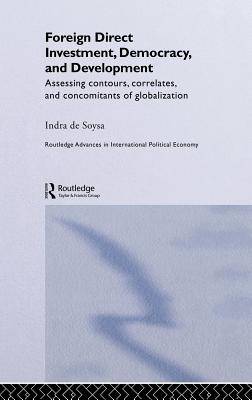
- Retrait gratuit dans votre magasin Club
- 7.000.000 titres dans notre catalogue
- Payer en toute sécurité
- Toujours un magasin près de chez vous
- Retrait gratuit dans votre magasin Club
- 7.000.0000 titres dans notre catalogue
- Payer en toute sécurité
- Toujours un magasin près de chez vous
Foreign Direct Investment, Democracy and Development
Assessing Contours, Correlates and Concomitants of Globalization
Indra de Soysa
79,45 €
+ 158 points
Format
Description
The effects of globalization on economy and society are highly contested subjects in academic and political arenas. This study brings an empirical perspective to the crucially important arguments that encapsulate the major debates in this area. Using quantitative data, this book addresses the shape and degree of internationalisation by focussing on the impact of Foreign Direct Investment (FDI) and democracy on economic development and the effects of economic internationalisation on democracy. The author examines democracy's effects on economic growth and considers the claim that foreign capital has a detrimental effect on democracy to show that FDI in fact plays a supporting role for democracy and creates higher growth rates than domestic capital. From these results the author suggests that policy makers should seek to encourage globalization by ensuring open access to products from poorer countries, encouraging private investment within poorer countries and that such countries should concentrate on building up human and institutional capital to attract investment.
Spécifications
Parties prenantes
- Auteur(s) :
- Editeur:
Contenu
- Nombre de pages :
- 172
- Langue:
- Anglais
- Collection :
- Tome:
- n° 8
Caractéristiques
- EAN:
- 9780415250542
- Date de parution :
- 01-05-03
- Format:
- Livre relié
- Format numérique:
- Genaaid
- Dimensions :
- 162 mm x 241 mm
- Poids :
- 435 g

Les avis
Nous publions uniquement les avis qui respectent les conditions requises. Consultez nos conditions pour les avis.






